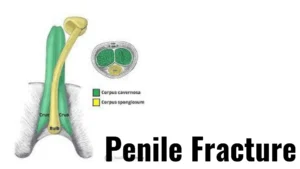Penile Fracture: Causes, Symptoms, and Urgent Care
Introduction
Penile fracture is a rare, yet extremely painful, condition that occurs when the erect penis is forcefully bent or snapped, resulting in a tear in the tunica albuginea, the thick sheath of connective tissue surrounding the erectile chambers. While penile fractures may occur during sexual activity, they can also happen due to other factors such as vigorous masturbation or accidents. Prompt medical attention is crucial in these cases as delay in treatment can lead to complications and long-term consequences.

Overview
A penile fracture is a severe injury that requires immediate medical attention. It typically occurs during sexual intercourse when the penis impacts a hard surface or is bent forcefully. The key symptom of a penile fracture is an audible “popping” sound followed by intense pain, swelling, and immediate loss of erection. Other common signs include bruising, difficulty urinating, and the appearance of a lump or deformity in the shaft. While rare, blood in the urine or the inability to recollect the traumatic event should also raise concern.
Symptoms and Causes
– Symptoms: 1. An audible “popping” sound during the injury 2. Severe pain and tenderness 3. Immediate loss of erection and difficulty achieving one afterward 4. Swelling and bruising of the penis 5. Difficulty urinating or blood in the urine – Causes: 1. Forceful bending of the erect penis during sexual activity 2. Accidental trauma to the penis, such as hitting or bending it 3. Vigorous masturbation or self-inflicted injury
Diagnosis and Tests
If you suspect a penile fracture, it is vital to seek immediate medical care. A physical examination will be conducted to assess the symptoms and potential fractures. Imaging tests, such as an ultrasound or magnetic resonance imaging (MRI), may be necessary to confirm the diagnosis and evaluate the extent of the injury. These tests help determine if surgery is required and identify any associated injuries to the urethra or surrounding structures.
Management and Treatment
The treatment for penile fracture typically involves surgical intervention. Surgery restores the integrity of the tunica albuginea and allows for proper healing. The procedure may involve cleaning the wound, repairing the tear with sutures, and draining any accumulated blood or fluid. After surgery, pain medication and antibiotics may be prescribed to prevent infection and manage discomfort. Following the surgical procedure, it is essential to refrain from sexual activity until the penis is fully healed, which typically takes about six weeks.
Prevention
While penile fractures cannot always be prevented, there are measures one can take to minimize the risk. Engaging in sexual activities with caution, ensuring sufficient lubrication during intercourse, and avoiding positions that put excessive strain on the penis can help reduce the possibility of injury. Additionally, communication with your partner regarding comfort levels and avoiding rough or vigorous handling of the penis during sexual encounters may also contribute to preventing penile fractures.
Outlook / Prognosis
With timely medical intervention and appropriate treatment, the outlook for penile fractures is generally good. Most individuals make a full recovery and regain normal erectile function. However, complications can arise, including erectile dysfunction, abnormal curvature of the penis (Peyronie’s disease), and psychological effects such as stress and anxiety related to sexual activity. It is crucial to follow the recommended post-operative care, attend scheduled follow-up visits, and openly discuss any concerns with your healthcare provider to ensure the best possible outcome.
Frequently Asked Questions
Q: Can masturbation cause a penile fracture? A: While rare, vigorous masturbation with excessive bending and pressure on the erect penis can potentially lead to a penile fracture. Q: Is surgery always necessary for a penile fracture? A: In most cases, surgical intervention is required to repair the tear in the tunica albuginea and restore proper function to the penis. Q: Can a penile fracture happen during non-penetrative sexual activities? A: Yes, penile fractures can occur during any sexual activity that involves sudden and forceful bending of the erect penis, including non-penetrative activities.